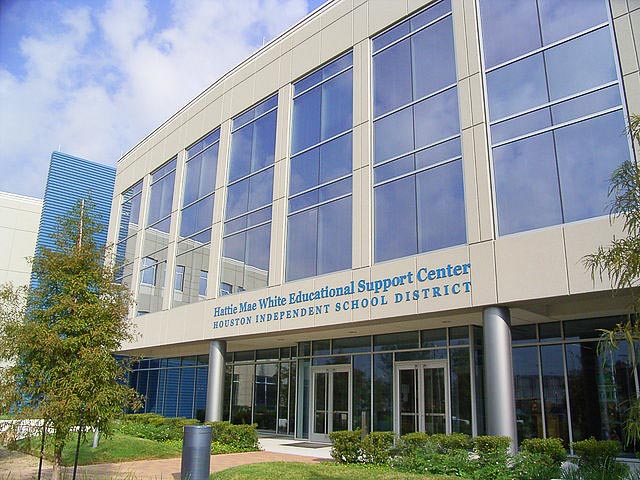Now, two Houston researchers are working to solve that problem. And they’re hoping to help other communities across the country do the same.
Houston Independent School District – the largest school district in Texas – has opened a massive trove of data to researchers at Rice University and elsewhere. It wants experts to comb through its data and answer the district’s questions about which programs are working and which aren’t.
The request is somewhat unusual, since HISD is voluntarily opening its doors to outsiders who may wind up highlighting areas where the district’s programs aren’t working. But district leaders say they welcome the opportunity to work with researchers who can help improve the quality of students’ education.
“We want to close the achievement gap,” said Carla Stevens, HISD’s assistant superintendent for research and accountability. “It’s all in an effort to help us figure out what’s working and what’s not in order to help us improve.”
Researchers working with the data say the move is a testament to the district’s commitment to students.
“The whole idea here is we have a mutual mission to help the students,” said Dr. Ruth N. López Turley, associate director of Rice University’s Kinder Institute for Urban Research. “If that means they find out something isn’t working, they try something else.”
The backbone of their partnership, known as the Houston Education Research Consortium (HERC), is a massive and constantly-updating database containing information on every student who’s spent time in the district since 2006. Data points like test scores, demographics and disciplinary actions are maintained for more than 300,000 students. And it’s all linked to a related database of more than 12,000 district teachers.
Students’ and teachers’ names and identifying information aren’t included in the data, and access is strictly controlled. Both HERC and the district must approve researchers’ requests for access.
That huge volume of information means district leaders, with the help of researchers, can make decisions based on clearly-identified patterns rather than anecdotes they hear from parents, teachers or other stakeholders.
In one case, the consortium’s researchers analyzed ASPIRE, a $40 million program that bases teacher bonuses, in part, on students’ year-over-year improvements. Researchers were tasked with determining whether those payments really made a difference in student performance. Much to their surprise, they did.
“Teachers that had a bonus had students with better gains the following year,” Turley said. “That informed the district that all the money they’re investing in this program isn’t being wasted. It’s actually leading to higher gains.”
The HERC researchers also analyzed a program that places students who struggle with reading into an additional remedial reading course that replaces an elective class.
Researchers found that the initial year of the program didn’t contribute to better reading performance. Now they’re trying to determine whether changes made to the program in its second year have led to student improvement.
“HISD wants the answers,” Turley said. “As a leader, you don’t want to be spending money on something that’s not working and isn’t improving students’ lives.”
The journal Educational Evaluation and Policy Analysis published a paper Turley and Stevens co-wrote about the HERC program in its May issue.
The partnership between Rice and HISD emerged in 2011, following high-level meetings that went all the way up to Rice President David Leebron and HISD Superintendent Terry Grier.
By working jointly, Turley said, each institution can overcome obstacles that typically prevent rigorous analysis of K-12 programs.
HISD gains access to Rice University researchers who have local expertise. And because the university is independent of the school district, the public is likely to view its analyses of HISD programs with credibility.
Universities, meanwhile, tend to have robust research staffs, not to mention armies of students who need research experience. As a result, they can serve as a valuable supplement to school districts’ own researchers, who sometimes face other demands.
“Having HERC expands our capacity to respond to the needs of the district and allows us to provide more evaluations and deeper research,” Stevens said.
Rice researchers, meanwhile, get the professional satisfaction of performing work that has real-world implications. Most academic research on education is published in journals, where it’s primarily read by other academics, not policymakers who can actually act on it.
Typically, researchers in academia are rewarded for work that’s published – not for work that produces policy changes. In some cases, that means academics haven’t had a professional motivation to try to influence policy, Turley said.
Meanwhile, other hurdles face institutions that try to develop similar partnerships. Funding must be secured to develop the databases and infrastructure that power a program like HERC. School districts and universities also have cultural differences, and leaders at each typically lack experience forging partnerships with the other.
Still, several large cities have managed to develop collaborations similar to the one that’s unfolding in Houston. Those teams will convene in Houston as part of a conference in Houston later this summer.
“Improving the connection between research and policy can lead to better decision-making, reduce the research-to-policy timeline, and greatly improve the education outcomes of all children, especially the most disadvantaged,” Turley said.

